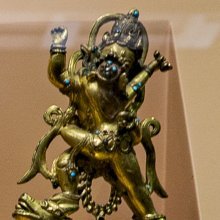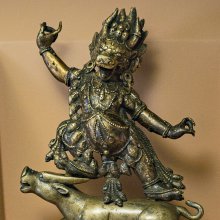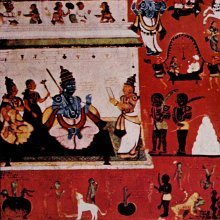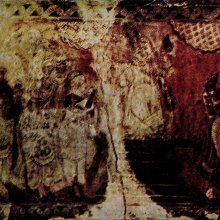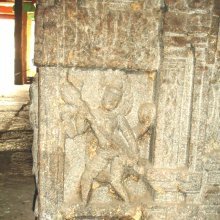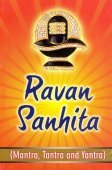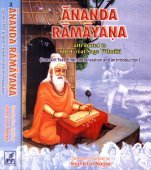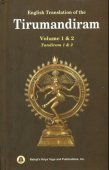Yama, Yāma, Yāmā: 61 definitions
Introduction:
Yama means something in Buddhism, Pali, Hinduism, Sanskrit, Jainism, Prakrit, the history of ancient India, Marathi, Hindi. If you want to know the exact meaning, history, etymology or English translation of this term then check out the descriptions on this page. Add your comment or reference to a book if you want to contribute to this summary article.
Yama has 61 English definitions available.
Images (photo gallery)
(+2 more images available)
Languages of India and abroad
Sanskrit dictionary
[Deutsch Wörterbuch]
Source: Cologne Digital Sanskrit Dictionaries: Böhtlingk and Roth Grosses Petersburger WörterbuchYama (यम):—
--- OR ---
Yama (यम):—
--- OR ---
Yāma (याम):—1. (von yam) m. nom. act. [Vopadeva’s Grammatik 26, 170.] = yama, saṃyama u.s.w. [Amarakoṣa 3, 3, 18.] [Hemacandra’s Anekārthasaṃgraha 2, 333.] [Medinīkoṣa Manu’s Gesetzbuch 24.] — Vgl. antaryāma .
--- OR ---
Yāma (याम):—2. (von 2. yama)
1) adj. (f. ī) Yama betreffend, von ihm kommend u.s.w. [Aitareyabrāhmaṇa 3, 37.] [Taittirīyabrāhmaṇa 1, 4, 6, 6.] [Kauśika’s Sūtra zum Atuarvaveda 83.] [Kāṭhaka-Recension 22, 11.] adbhutāni [Ṣaḍviṃśabrāhmaṇa] in [Weber’s Indische Studien 1, 36. fg.] yātanāḥ [Manu’s Gesetzbuch 12, 17. 21. fg.] —
2) n. Name verschiedener Sāman [Weber’s Indische Studien.3,230,b.] [Taittirīyabrāhmaṇa.3,9,10,1.] [Śāṅkhāyana’s Śrautasūtrāṇi 16,12,20.] [Pañcaviṃśabrāhmaṇa.9,8,4.] [Kātyāyana’s Śrautasūtrāṇi 22,6,15]; vgl. mahā .
--- OR ---
Yāma (याम):—
--- OR ---
Yāma (याम):—2.
1) etwas für Yama Bestimmtes [Atharvavedasaṃhitā 6, 116, 1.]
Source: Cologne Digital Sanskrit Dictionaries: Sanskrit-Wörterbuch in kürzerer FassungYama (यम):—1. —
1) Zügel. —
2) Lenker [Ṛgveda (roth). 8,24,22.] —
3) Hemmung , Unterdrückung. —
4) in der Philosophie Selbstbezwingung , das Verbot der Beschädigung Anderer durch Wort oder That und der Ueppigkeit , ein allgemeines Sittengesetz , eine grosse Pflicht (vgl. niyama ). —
5) Observanz , Regel überh.
--- OR ---
Yama (यम):—2. —
1) Adj. (f. ā und ī geminus , von Geburt doppelt , gepaart. yamyāṃ Nomin. Du. f. [Ṛgveda (roth). 3,33.11.] —
2) m. — a) Zwilling , Du. Zwillinge. — b) Bez. der Zahl zwei [Hemādri’s Caturvargacintāmaṇi 1,135,23.] — c) Du. Bez. der Aśvin. — d) Name des Gottes , der im Himmel über die Seligen herrscht , deshalb auch König heisst , ein Sohn Vivasvant's. Die nachvedische Zeit sieht in ihm den in der Unterwelt thronenden Todesgott und fasst seinen Namen als Bändiger (s. 1. yama ). Die wirkliche Bed. ist Zwilling: Yama und Yamī sind das erste Menschenpaar. Wie diese nach der Legende von Vivasvant mit der Saraṇyü (Saṃjṅā [100,6.7]) den Manu , eine andere Form des Erstlings der Menschen. Im [MBH] und später ist Yama ein jüngerer Bruder Manu's. Trauer der Yami über den Tod Yama’s [Maitrāyaṇi 1,5,12.] Yama ist Welthüter des Südens , Regent des Mondhauses Apabharaṇi (Bharaṇī) , Verfasser von Liedern und eines Gesetzbuches. yamasyārkaḥ Name eines Sāman [Ārṣeyabrāhmaṇa] — e) der Planet Venus (gilt gleichfalls für einen Sohn Vivasvant's). — f) *Krähe. — g) Nomen proprium . — α) eines Wesens im Gefolge Skanda's. . — β) Pl. einer Klasse von Göttern bei den Buddhisten: richtig yāma. —
3) f. ī Nomen proprium der Zwillingsschwester Yama’s ([Maitrāyaṇi 1,5,12]), die in der nachvedischen Zeit der Yamuna gleichgesetzt wird. —
4) n. — a) Paar. — b) in der Grammatik . — α) Zwillingslaut ; so heissen gewisse von den Grammatikern angenommene nasale Zwischenlaute zwischen Mutis und folgenden Nasalen. . — β) Tonlage.
--- OR ---
Yāma (याम):—1. m. —
1) das Aufhören , Schluss [Taittirīyasaṃhitā 6,6,6,2.] —
2) * = yama , saṃyama u.s.w. Vgl. antaryāma.
--- OR ---
Yāma (याम):—2. —
1) Adj. (f. ī) Yama betreffend , von ihm kommend ([Śaṃkarācārya .zu.Bādarāyaṇa’s Brahmasūtra 3,1,13]), für ihn bestimmt u.s.w. —
2) n. Name verschiedener Sāman.
--- OR ---
Yāma (याम):—3. —
1) m. — a) Fahrt , Lauf ; Bahn ; Fortgang. — b) Wagen. — c) Nachtwache , ein Zeitraum von drei Stunden. Am Ende eines adj. Comp. f. ā. — d) Pl. eine best. Klasse von Göttern — e) yāmasyārkaḥ als Name eines Sāman fehlerhaft für yamasyārkaḥ. —
2) f. yāmī Nomen proprium — a) einer Tochter Dakṣa’s und Gattin Dharma’s (Manu's). — b) einer Apsaras.
Sanskrit, also spelled संस्कृतम् (saṃskṛtam), is an ancient language of India commonly seen as the grandmother of the Indo-European language family (even English!). Closely allied with Prakrit and Pali, Sanskrit is more exhaustive in both grammar and terms and has the most extensive collection of literature in the world, greatly surpassing its sister-languages Greek and Latin.
See also (Relevant definitions)
Starts with (+366): Yama bush, Yama Deva, Yama-asa, Yama-buki, Yama-danmu, Yama-guwa, Yama-kanda, Yama-muhurta, Yama-sato-imo, Yama-tachibana, Yamaarug, Yamabadha, Yamabala, Yamabali, Yamabandhana, Yamabhadhe, Yamabhadra, Yamabhagini, Yamabhara, Yamabhata.
Ends with (+323): Abhiniyama, Abhrashyama, Abhyantarayama, Adhamamadhyama, Adhayama, Adhikatama-samyama, Adhiniyama, Adhyayananiyama, Agnimiyama, Agnishomayama, Agradhanyama, Agrayaniyama, Ahastriyama, Aidayama, Alamuniyama, Alpamadhyama, Amadhyama, Amangwe emnyama, Amrishodyama, Amtarniyama.
Full-text (+1712): Yami, Antaka, Citragupta, Yamya, Yamaduta, Pitriraja, Yamadanda, Mrityu, Yamavrata, Dharmaraja, Kritanta, Ardhayama, Triyama, Yamayama, Yamadhani, Yamaraj, Yamapriya, Yamavati, Yamavahana, Dhama.
Relevant text
Search found 258 books and stories containing Yama, Yāma, Yāmā; (plurals include: Yamas, Yāmas, Yāmās). You can also click to the full overview containing English textual excerpts. Below are direct links for the most relevant articles:
Rig Veda (translation and commentary) (by H. H. Wilson)
Garga Samhita (English) (by Danavir Goswami)
Verse 2.5.9 < [Chapter 5 - The Liberation of Bakāsura]
Verse 4.8.39 < [Chapter 8 - In the Story of the Yajña-sītās, the Glories of Ekādaśī]
Verse 6.15.21 < [Chapter 15 - The Glories of Nṛga-kūpa and Gopī-bhūmi]
Amarakoshodghatana of Kshirasvamin (study) (by A. Yamuna Devi)
Philosophy (2): Yoga (Patañjali) < [Chapter 4 - Cultural Aspects]
Internal Anatomy < [Chapter 3 - Social Aspects]
Mythical Informations < [Chapter 4 - Cultural Aspects]
Yogadrstisamuccaya of Haribhadra Suri (Study) (by Riddhi J. Shah)
Chapter 4.1b - Yama (Restraint or Self-control) < [Chapter 4 - The Eight Yogadṛṣṭis and the nature of a Liberated Soul]
Chapter 4.2b - Niyama (restraint of the mind) < [Chapter 4 - The Eight Yogadṛṣṭis and the nature of a Liberated Soul]
Chapter 4.1a - The First: Mitrādṛṣṭi (mitrā-dṛṣṭi)—Introduction < [Chapter 4 - The Eight Yogadṛṣṭis and the nature of a Liberated Soul]
Bhajana-Rahasya (by Srila Bhaktivinoda Thakura Mahasaya)
Editor’s Preface to the English Edition
Text 6 < [Chapter 1 - Prathama-yāma-sādhana (Niśānta-bhajana–śraddhā)]
Puranic encyclopaedia (by Vettam Mani)
Related products
(+2 more products available)
